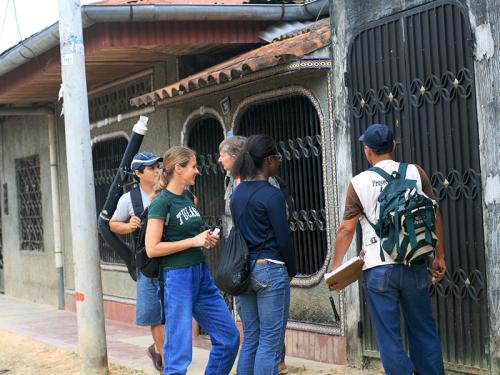
The PhD program in International Health and Sustainable Development (IHSD) prepares the next generation of global public health researchers to conduct state-of-the-art research on global health and development issues, reduce inequities, and shape a sustainable future for the planet. The PhD program provides students with the skills to identify, assess, and apply scientific theories and research methodologies; to conduct original scientific research studies in resource-constrained settings; to leverage research findings towards best practice and strategic planning for global health programs; and to teach, mentor and advise students, programs, development officials, and governments. Students will develop an understanding of relevant theories, the capacity to employ interdisciplinary and mixed-method research approaches, cultural competency, and the skills for ethical conduct of research.
The primary objectives of the IHSD PhD are:
- To provide strong instructional coursework, experiential learning opportunities, and mentorship that enable students to design and conduct field-based research and/or support large-scale program planning and monitoring and evaluation endeavors, analyze primary and secondary data to achieve research goals, and communicate research findings to different audiences for program and policy decision-making.
- To develop a cadre of independent researchers who will advance global health knowledge and practices in post-graduation employment to reduce health inequities and support the goals of sustainable human development.
As part of the IHSD PhD, students will work alongside faculty, public health researchers, and their classmates, all of whom share a commitment to better global health, reduced inequities, and a more sustainable future.
Students applying to the Doctor of Philosophy in International Health and Sustainable Development program must meet the school's general admission requirements.
Degree Program Requirements & Competencies–49 credit hours
Please visit the university course catalog for:
Educational teaching assistant experience
All PhD students at the WSPH are required to serve as a teaching assistant (TA) for two WSPH courses while enrolled in the PhD program. Students should register for Teaching Assistantship Educational Experience (0 credits) during the terms they complete each TA requirement.
All other program requirements (e.g. research ethics, comprehensive exam, prospectus, and dissertation) remain the same across the old and revised programs, as outlined in the PhD Handbook.
Department Chair: David Hotchkiss, PhD
Program Director: Paul Hutchinson, PhD
Program Manager: Gale Marie Abbass
Email: ihsd@tulane.edu
Phone: (504) 988-5391
Ready for More?
Request Information Connect With Us Public Health Discovery Seminars
